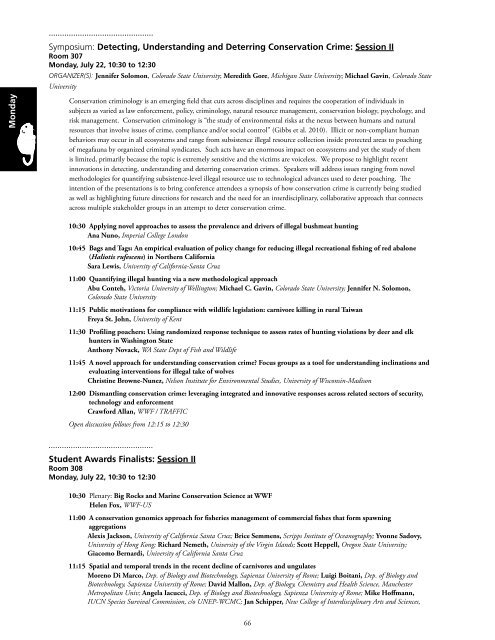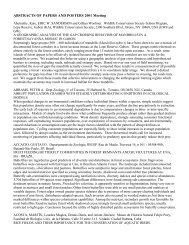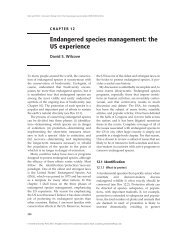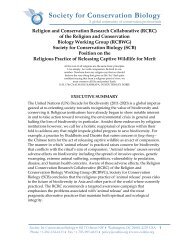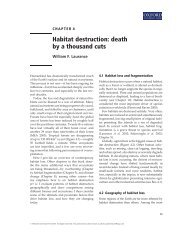ICCB 2013 Program - Society for Conservation Biology
ICCB 2013 Program - Society for Conservation Biology
ICCB 2013 Program - Society for Conservation Biology
You also want an ePaper? Increase the reach of your titles
YUMPU automatically turns print PDFs into web optimized ePapers that Google loves.
...............................................<br />
Symposium: Detecting, Understanding and Deterring <strong>Conservation</strong> Crime: Session II<br />
Room 307<br />
Monday, July 22, 10:30 to 12:30<br />
Organizer(s): Jennifer Solomon, Colorado State University; Meredith Gore, Michigan State University; Michael Gavin, Colorado State<br />
University<br />
Monday<br />
<strong>Conservation</strong> criminology is an emerging field that cuts across disciplines and requires the cooperation of individuals in<br />
subjects as varied as law en<strong>for</strong>cement, policy, criminology, natural resource management, conservation biology, psychology, and<br />
risk management. <strong>Conservation</strong> criminology is “the study of environmental risks at the nexus between humans and natural<br />
resources that involve issues of crime, compliance and/or social control” (Gibbs et al. 2010). Illicit or non-compliant human<br />
behaviors may occur in all ecosystems and range from subsistence illegal resource collection inside protected areas to poaching<br />
of megafauna by organized criminal syndicates. Such acts have an enormous impact on ecosystems and yet the study of them<br />
is limited, primarily because the topic is extremely sensitive and the victims are voiceless. We propose to highlight recent<br />
innovations in detecting, understanding and deterring conservation crimes. Speakers will address issues ranging from novel<br />
methodologies <strong>for</strong> quantifying subsistence-level illegal resource use to technological advances used to deter poaching. The<br />
intention of the presentations is to bring conference attendees a synopsis of how conservation crime is currently being studied<br />
as well as highlighting future directions <strong>for</strong> research and the need <strong>for</strong> an interdisciplinary, collaborative approach that connects<br />
across multiple stakeholder groups in an attempt to deter conservation crime.<br />
10:30 Applying novel approaches to assess the prevalence and drivers of illegal bushmeat hunting<br />
Ana Nuno, Imperial College London<br />
10:45 Bags and Tags: An empirical evaluation of policy change <strong>for</strong> reducing illegal recreational fishing of red abalone<br />
(Haliotis rufescens) in Northern Cali<strong>for</strong>nia<br />
Sara Lewis, University of Cali<strong>for</strong>nia-Santa Cruz<br />
11:00 Quantifying illegal hunting via a new methodological approach<br />
Abu Conteh, Victoria University of Wellington; Michael C. Gavin, Colorado State University; Jennifer N. Solomon,<br />
Colorado State University<br />
11:15 Public motivations <strong>for</strong> compliance with wildlife legislation: carnivore killing in rural Taiwan<br />
Freya St. John, University of Kent<br />
11:30 Profiling poachers: Using randomized response technique to assess rates of hunting violations by deer and elk<br />
hunters in Washington State<br />
Anthony Novack, WA State Dept of Fish and Wildlife<br />
11:45 A novel approach <strong>for</strong> understanding conservation crime Focus groups as a tool <strong>for</strong> understanding inclinations and<br />
evaluating interventions <strong>for</strong> illegal take of wolves<br />
Christine Browne-Nunez, Nelson Institute <strong>for</strong> Environmental Studies, University of Wisconsin-Madison<br />
12:00 Dismantling conservation crime: leveraging integrated and innovative responses across related sectors of security,<br />
technology and en<strong>for</strong>cement<br />
Craw<strong>for</strong>d Allan, WWF / TRAFFIC<br />
Open discussion follows from 12:15 to 12:30<br />
...............................................<br />
Student Awards Finalists: Session II<br />
Room 308<br />
Monday, July 22, 10:30 to 12:30<br />
10:30 Plenary: Big Rocks and Marine <strong>Conservation</strong> Science at WWF<br />
Helen Fox, WWF-US<br />
11:00 A conservation genomics approach <strong>for</strong> fisheries management of commercial fishes that <strong>for</strong>m spawning<br />
aggregations<br />
Alexis Jackson, University of Cali<strong>for</strong>nia Santa Cruz; Brice Semmens, Scripps Institute of Oceanography; Yvonne Sadovy,<br />
University of Hong Kong; Richard Nemeth, University of the Virgin Islands; Scott Heppell, Oregon State University;<br />
Giacomo Bernardi, University of Cali<strong>for</strong>nia Santa Cruz<br />
11:15 Spatial and temporal trends in the recent decline of carnivores and ungulates<br />
Moreno Di Marco, Dep. of <strong>Biology</strong> and Biotechnology, Sapienza University of Rome; Luigi Boitani, Dep. of <strong>Biology</strong> and<br />
Biotechnology, Sapienza University of Rome; David Mallon, Dep. of <strong>Biology</strong>, Chemistry and Health Science, Manchester<br />
Metropolitan Univ; Angela Iacucci, Dep. of <strong>Biology</strong> and Biotechnology, Sapienza University of Rome; Mike Hoffmann,<br />
IUCN Species Survival Commission, c/o UNEP-WCMC; Jan Schipper, New College of Interdisciplinary Arts and Sciences,<br />
66


